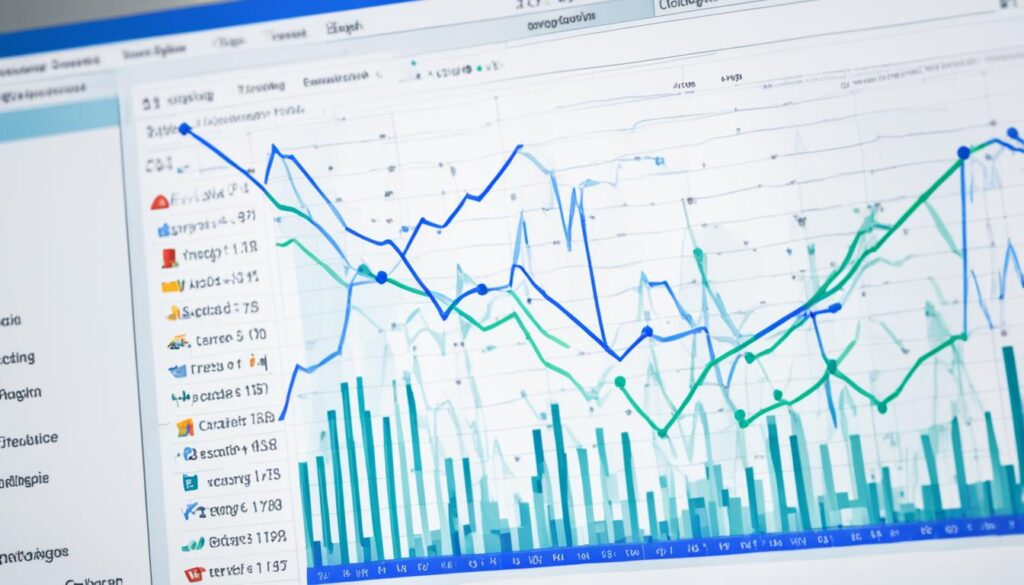Improving your website’s SEO ranking is crucial for increasing its visibility and attracting more organic traffic. To achieve higher rankings on search engine results pages (SERPs), you need to understand the key factors that impact SEO ranking and implement effective strategies to improve them. In this article, we will explore the essential SEO ranking factors that can help you boost your website’s visibility and climb the SERP ladder.

Key Takeaways:
- SEO ranking factors play a critical role in improving your website’s visibility and attracting organic traffic.
- Staying updated with the latest developments in SEO ranking factors is essential for effective optimization.
- Google’s algorithms determine rankings based on factors like content relevance, user experience, and trustworthiness.
- E-A-T (Expertise, Authority, and Trustworthiness) are important factors for SEO rankings, particularly for YMYL websites.
- On-page and off-page SEO factors both contribute to higher search rankings.
Understanding SEO Ranking and How Google Rankings Work
SEO ranking plays a critical role in determining the visibility of your content on search engine results pages (SERPs). Achieving higher rankings is a top priority for businesses and website owners who want to increase their online presence and attract more organic traffic. But how exactly do you rank higher on Google?
When users search for relevant terms, Google’s algorithms evaluate various factors to determine the most relevant and high-quality results. These factors include:
- Content: The quality, depth, and relevance of your content to the user’s query.
- Relevance: How well your content matches the search query and user intent.
- User Experience: The overall usability and accessibility of your website.
- Trustworthiness: The credibility and authority of your website, including backlinks from reputable sources.
Google’s goal is to provide the best user experience and deliver the most relevant search results. Therefore, websites with high-quality content and a positive user experience are more likely to rank higher in search results.
Aiming for the top three results or appearing on the first page is crucial. Users tend to trust and click on websites that appear at the top of the SERPs, resulting in more organic traffic and potential conversions. To improve your search rankings, it’s important to focus on optimizing these key factors.
However, it’s essential to note that SEO ranking factors are constantly changing. Google regularly updates its algorithms to improve user satisfaction and combat spammy practices. Staying up-to-date with the latest developments and adapting your SEO strategies accordingly will help you maintain or improve your search rankings.
Remember, achieving higher SEO rankings requires a combination of factors, including compelling content, relevance, user experience, and trustworthiness. By implementing effective SEO strategies and continuously optimizing your website, you can climb the SERP ladder and increase your online visibility.

| Benefits of Higher SEO Rankings: |
|---|
| Increased website visibility |
| Higher organic traffic |
| Greater brand exposure |
| Improved credibility and trustworthiness |
| Increased potential for conversions |
The Basics of SEO Ranking Factors
When it comes to your website’s visibility and ranking in search engine results, understanding the basics of SEO ranking factors is essential. These factors encompass various aspects that affect how search engines like Google determine the relevance and credibility of your website.
Security and Accessibility
One important SEO ranking factor is the security and accessibility of your website. Having a secure website with HTTPS encryption not only protects user data but also builds trust with search engines and users. Additionally, ensuring your website is accessible to all users, including those with disabilities, can improve your SEO ranking.
Page Speed and Mobile-Friendliness
Page speed is another crucial SEO ranking factor that affects user experience. A fast-loading website not only improves user satisfaction but also signals to search engines that your site offers a high-quality experience. Mobile-friendliness is equally important, as more users access the internet through mobile devices. Optimizing your site for mobile devices enhances user experience and can boost your SEO ranking.
Domain Age and Authority
The age and authority of your domain can also impact your SEO ranking. Older domains are often considered more trustworthy, while domains with established authority, indicated by high-quality backlinks from reputable websites, can boost your website’s credibility in the eyes of search engines.
Optimized Content and Technical SEO
Creating optimized content that is relevant to your target audience and includes strategically placed keywords is essential for SEO ranking. Technical SEO elements, such as proper header tags, meta descriptions, and structured data markup, also play a role in improving your website’s visibility and ranking.
User Experience and Engagement
User experience is a critical factor in SEO ranking. Search engines prioritize websites that offer a positive user experience, including easy navigation, intuitive design, and engaging content. Factors such as dwell time, bounce rate, and the number of organic visits contribute to your website’s overall engagement and can impact your SEO ranking.
Backlinks and Social Signals
Backlinks from authoritative websites and social signals, such as social media shares and engagement, signal to search engines the relevance and popularity of your content. Building high-quality backlinks and actively engaging with your target audience on social media can positively influence your SEO ranking.
Accurate Business Information
For local businesses, accurate and consistent business information, such as your name, address, and phone number (NAP), is crucial for SEO rankings. Ensuring your NAP information is up-to-date and listed on relevant directories can improve your website’s visibility in local search results.
By understanding and implementing these basic SEO ranking factors, you can optimize your website for better search engine visibility and improve your Google rankings.

Now that you have a good understanding of the basics, let’s explore the importance of E-A-T (Expertise, Authority, and Trustworthiness) in SEO rankings in the next section.
The Importance of E-A-T in SEO Rankings
Expertise, Authority, and Trustworthiness (E-A-T) play a significant role in determining SEO rankings, especially after Google’s “medic update.” Google recognizes the importance of providing users with accurate and trustworthy information, particularly for websites in critical areas like healthcare and finance. In light of this, establishing expertise, displaying authority, and showcasing trustworthiness are crucial for improving your website’s SEO rankings.
Expertise: Demonstrating your expertise in a specific subject matter is essential for gaining credibility and attracting both users and search engines. Showcase your knowledge through well-researched and comprehensive content, backed by reputable sources and expert contributors. By positioning yourself as an authority in your industry, you can significantly improve your SEO rankings.
Authority: Building authority involves establishing your website as a reputable source of information within your niche. This can be achieved through high-quality backlinks from other authoritative websites, guest posting on reputable platforms, and collaborating with influencers or industry experts. Google considers these signals as indicators of trustworthiness and boosts your search rankings accordingly.
Trustworthiness: Trustworthiness is a vital aspect of SEO rankings, particularly for websites dealing with sensitive topics or involved in financial transactions. Google wants to ensure that users can trust the information they find online. To enhance trustworthiness, be transparent about the authorship of your content, display contact information and privacy policies, and incorporate customer testimonials or reviews. Implementing trust signals on your website will increase your credibility and improve your search rankings.
Remember, E-A-T is not only about showcasing your expertise, authority, and trustworthiness to search engines. It’s also about building trust and providing valuable information to your target audience, establishing your brand as a leader in your industry.
By prioritizing E-A-T factors in your SEO strategy, you can enhance your website’s visibility, attract more organic traffic, and improve your overall search rankings. It’s worth investing time and effort into establishing your expertise, building authority, and showcasing trustworthiness, as these factors are becoming increasingly vital in the dynamic world of SEO.

Comparing E-A-T Factors
| E-A-T Factors | Importance | Impact on SEO Rankings |
|---|---|---|
| Expertise | High | Establishes credibility and attracts users and search engines |
| Authority | High | Builds trust through reputable backlinks and collaborations |
| Trustworthiness | High | Enhances credibility with transparency and trust signals |
On-Page and Off-Page SEO Factors
When it comes to optimizing your website for search engines, there are two key categories of SEO factors to consider: on-page and off-page. Both of these factors play a significant role in determining your website’s SEO ranking. Let’s take a closer look at each of them:
On-Page SEO Factors
On-page SEO factors refer to the optimization techniques that you implement directly on your website. These factors ensure that your website is search engine friendly and can be easily understood and indexed by search engines.
Some essential on-page SEO factors include:
- Keyword Usage: Properly integrating relevant keywords into your website’s content, meta tags, headings, and URLs.
- Content Relevance: Creating high-quality, informative, and relevant content that satisfies the search intent of users.
- Website Structure: Ensuring a clear and user-friendly website structure that is easy to navigate.
- Mobile-Friendliness: Optimizing your website for mobile devices to provide a seamless user experience.
- Page Loading Speed: Enhancing your website’s loading speed to reduce bounce rates and improve user experience.
Implementing these on-page SEO factors can help search engines understand the relevance and quality of your content, resulting in higher rankings and increased visibility for your website.
Off-Page SEO Factors
While on-page SEO factors focus on optimizing your website directly, off-page SEO factors involve external factors that contribute to your website’s authority and trustworthiness.
Some key off-page SEO factors include:
- Backlinks: Acquiring high-quality backlinks from authoritative websites, indicating to search engines that your website is trustworthy and valuable.
- Social Signals: Engaging with your audience on social media platforms and generating social signals that demonstrate your website’s credibility and popularity.
- Online Reputation Management: Maintaining a positive online reputation through customer reviews and managing your brand’s online presence.
These off-page SEO factors help search engines gauge the reputation and authority of your website, which can positively impact your SEO rankings.
By combining effective on-page and off-page SEO strategies, you can improve your website’s visibility, attract more organic traffic, and ultimately boost your SEO ranking.

With a clear understanding of on-page and off-page SEO factors, you can now proceed to implement targeted strategies to optimize your website effectively.
Monitoring and Tracking SEO Rankings
Monitoring and tracking the performance of your website’s SEO rankings is crucial for evaluating its visibility and progress. By understanding your starting point and regularly monitoring your rankings, you can identify areas for improvement and assess the effectiveness of your SEO strategies. This section will delve into the importance of monitoring and tracking SEO rankings, and how you can utilize tools like Semrush’s Position Tracking to achieve optimal results.
The Significance of Monitoring SEO Rankings
Monitoring your SEO rankings enables you to gain valuable insights into how your website is performing in search engine results pages (SERPs). It helps you gauge the impact of your optimization efforts and determine if your strategies are yielding the desired outcomes. By closely monitoring your rankings, you can:
- Identify opportunities for improvement: Tracking rankings provides you with the data necessary to identify areas where your website may be underperforming and take corrective action.
- Evaluate the effectiveness of your SEO strategies: By analyzing ranking trends over time, you can assess the impact of your optimization efforts and make data-driven decisions to improve your website’s visibility.
- Stay ahead of your competition: Monitoring your rankings allows you to keep a close eye on your competitors and identify any shifts in their performance. This knowledge can inform your SEO strategy and help you maintain a competitive edge.
- Measure the success of your SEO campaigns: Tracking rankings provides measurable data that allows you to determine the success of your SEO campaigns and justify the allocation of resources.
Tracking Keyword Rankings with Semrush’s Position Tracking
Semrush’s Position Tracking tool offers a comprehensive solution for monitoring and analyzing your keyword rankings. This user-friendly tool enables you to:
- Track keyword rankings: Enter your target keywords, and Semrush will provide you with real-time data on your website’s position in search engine results.
- Set up ranking alerts: Stay informed about any significant changes in your rankings by configuring alerts that notify you of ranking fluctuations.
- Analyze ranking trends: Semrush’s Position Tracking tool provides visual representations of your ranking trends over time, allowing you to identify patterns and make informed decisions based on historical data.
- Conduct competitor analysis: Compare your website’s rankings with those of your competitors to gain insights into their strategies and identify areas for improvement.
By utilizing Semrush’s Position Tracking tool, you can effectively monitor your keyword rankings, gain valuable insights, and refine your SEO strategies for improved performance in search engine results.
Now that we’ve explored the importance of monitoring and tracking SEO rankings, let’s move on to the next section, which will delve into the fundamental concepts of SEO ranking factors.

What Is SEO Ranking and How Does It Work?
SEO ranking is a crucial element in determining the position of your webpage in search engine results. It plays a significant role in increasing your webpage’s visibility, attracting more organic traffic, and ultimately boosting your website’s performance. But how does SEO ranking actually work?
When a user searches for a specific query on search engines like Google, the search algorithm crawls through countless webpages to find the most relevant results. The algorithm takes multiple factors into account to evaluate the quality and relevance of each webpage.
Organic search results are the unpaid listings that search engines display based on their algorithm’s evaluation. The higher your webpage’s ranking, the more likely it is to appear closer to the top of these results. This prominent position increases the chances of users clicking on your webpage, driving valuable traffic to your site.
To improve your rankings and increase your webpage’s visibility, you need to optimize various factors that influence search engine algorithms. These factors include:
- The quality and relevance of your content: Creating high-quality, informative, and relevant content is essential for earning higher rankings.
- Backlinks from authoritative websites: Building a strong backlink profile helps establish your webpage’s credibility and boosts its rankings.
- Technical aspects of your website: Optimizing technical elements like website speed, mobile-friendliness, and user-friendly navigation improves user experience and contributes to better rankings.
- User experience: Evaluating user metrics like bounce rate, time on page, and click-through rates helps search engines assess webpage quality and relevance.
- Brand signals: A strong brand reputation, positive online presence, and social media engagement can positively impact your rankings.
By understanding and optimizing these factors, you can enhance your SEO ranking and increase your webpage’s visibility in organic search results. Improving your rankings requires a comprehensive SEO strategy focused on delivering high-quality content, building strong links, ensuring technical excellence, and providing an excellent user experience.
Google’s 200 Ranking Factors Explained
Google’s ranking algorithm considers over 200 factors to determine a website’s position in search results. It’s important to understand these factors and optimize your website accordingly to improve your search rankings on Google.
Some of the key ranking factors include:
- Content Quality: High-quality, relevant, and valuable content is essential for better rankings. Provide informative and engaging content that meets the needs of your target audience.
- Backlinks: Building quality backlinks from reputable and authoritative websites improves your website’s credibility and authority in the eyes of Google. Focus on acquiring relevant and natural backlinks.
- Technical SEO: Optimizing technical aspects such as website speed and mobile-friendliness enhances user experience and improves your website’s ranking.
- Keyword Optimization: Conduct thorough keyword research and optimize your content with relevant keywords. Use them strategically in your titles, headings, meta tags, and throughout your content.
- User Experience: A user-friendly website that is easy to navigate, loads quickly, and provides a seamless browsing experience contributes to higher rankings.
- Schema Markup: Implementing schema markup helps search engines understand your content better and can lead to enhanced visibility in search results.
- Social Signals: Social media engagement and activity can influence your website’s authority and popularity, indirectly impacting your search rankings.
- Brand Reputation: Your brand’s online reputation and trustworthiness play a role in Google’s evaluation. Positive reviews, testimonials, and mentions can boost your rankings.
Understanding and optimizing these ranking factors can significantly improve your website’s position on Google’s search results pages. Keep in mind that Google’s algorithm is constantly evolving, so staying up-to-date with the latest SEO trends and best practices is essential.
Domain Factors and Their Impact on SEO Rankings
When it comes to SEO rankings, domain factors play a significant role. Various elements related to your domain can affect the trustworthiness and authority of your website, ultimately influencing your search engine rankings. It’s important to understand and consider these domain factors when establishing and optimizing your website.
One crucial domain factor is the age of your domain. Domain age refers to the length of time your domain has been registered and active. Generally, older domains are considered more trustworthy by search engines, as they demonstrate stability and credibility. Therefore, having an older domain can positively impact your SEO rankings.
In addition to domain age, including keywords in your domain can also have a significant effect on SEO rankings. When you incorporate relevant keywords into your domain name, it helps search engines understand the nature and focus of your website. This keyword inclusion can enhance your website’s visibility and improve its rankings for relevant search queries.
Another important domain factor to consider is the history of your domain. Historical domain changes, such as frequent domain transfers or ownership changes, can raise concerns about the trustworthiness and consistency of your website. Search engines may view these changes as potentially suspicious or manipulative, which can negatively impact your SEO rankings.
The length of domain registration is another factor that can influence SEO rankings. Search engines tend to trust websites with longer registration periods, as it indicates a long-term commitment and seriousness towards maintaining the website. Consider registering your domain for a longer duration to enhance your website’s credibility and improve its SEO rankings.
Lastly, the choice between having private or public WhoIs information can also impact your website’s SEO rankings. Private WhoIs information protects your personal details from public access, but search engines may view it as an attempt to hide important information. On the other hand, public WhoIs information adds transparency and credibility to your website, potentially boosting your SEO rankings.
When optimizing your website for better SEO rankings, it’s crucial to carefully consider these domain factors. By understanding the importance of domain age, keyword inclusion, domain history, registration length, and WhoIs information, you can establish a trustworthy and authoritative online presence that helps improve your SEO rankings.
Note: The image above illustrates the impact of domain factors on SEO rankings. Domain age, keyword inclusion, domain history, registration length, and WhoIs information all influence the overall trustworthiness and authority of a website, ultimately affecting its search engine rankings.
Page-Level Factors That Affect SEO Rankings
When it comes to improving your website’s SEO ranking, optimizing page-level factors is crucial. These factors focus on the specific techniques implemented on individual webpages to enhance their visibility and relevance to search engines. By optimizing these page-level factors, you can boost your webpage’s SEO ranking and attract more organic traffic.
Keywords in Title Tag
One important page-level factor is the presence of relevant keywords in the title tag. The title tag is an HTML element that specifies the title of a webpage. Including targeted keywords in the title tag can improve the page’s visibility to search engines and potential visitors. It’s important to choose keywords that accurately represent the content of the page and align with search intent.
Content Length and Depth
The length and depth of your webpage’s content also play a role in SEO ranking. Search engines tend to favor content that provides comprehensive and detailed information. Longer, well-structured articles or pages that delve deep into a topic are more likely to rank higher in search results. However, it’s important to ensure that the lengthier content maintains high-quality standards and engages readers effectively.
Page Loading Speed
Page loading speed is a critical factor that directly impacts user experience and SEO ranking. Slow-loading pages frustrate users and increase bounce rates, negatively affecting your website’s performance. To improve page loading speed, you can optimize image sizes, minimize scripts and plugins, enable browser caching, and choose a reliable hosting provider. A fast-loading webpage enhances user satisfaction and contributes to better SEO ranking.
Use of Schema Markup
Schema markup is a code that provides additional context to search engines about the content on your webpage. By implementing schema markup, you can enhance the display of your page in search results with rich snippets, such as star ratings, reviews, or event details. These rich snippets make your webpage stand out and attract more clicks, ultimately improving your SEO ranking.
Image Optimization
Images on your webpage should also be optimized to improve SEO ranking. This includes using descriptive filenames, adding alt tags that describe the image, and compressing images to reduce file size without significantly impacting quality. Optimized images contribute to faster page loading and accessibility, ensuring a positive user experience.
Content Recency
Keeping your content up-to-date and fresh can positively influence your SEO ranking. Search engines prioritize recent and relevant content, as it often better serves user intent. Regularly updating and refreshing your webpage’s content signals to search engines that your website is active and provides valuable information. This can lead to improved rankings and increased organic traffic.
| Page-Level Factors | Impact on SEO Rankings |
|---|---|
| Keywords in Title Tag | Increase visibility and relevance to search engines |
| Content Length and Depth | Enhance website authority and provide comprehensive information |
| Page Loading Speed | Improve user experience and reduce bounce rates |
| Use of Schema Markup | Enhance search result appearance and attract more clicks |
| Image Optimization | Improve page loading speed and accessibility |
| Content Recency | Signal freshness and relevance to search engines |
Optimizing page-level factors is essential to improve your SEO ranking and increase your website’s visibility in search results. By implementing the strategies mentioned above, you can enhance the relevance, user experience, and overall performance of your webpages. Stay proactive in monitoring and optimizing these factors to stay ahead in the competitive online landscape.
Conclusion
Improving your website’s SEO ranking requires a holistic approach that encompasses various essential SEO strategies. By focusing on factors such as content quality, keyword optimization, technical SEO, user experience, backlinks, and brand reputation, you can make significant strides in improving your website’s ranking and visibility in search engine results.
Creating high-quality, engaging content that is relevant to your target audience is crucial for SEO success. By optimizing your content with targeted keywords, you can increase its visibility and attract more organic traffic to your website. Additionally, ensuring that your website is technically optimized for search engines, with fast loading speeds and mobile-friendliness, will contribute to better rankings.
Building a strong backlink profile and establishing your authority within your industry will also improve your website’s SEO ranking. By earning high-quality backlinks from reputable websites, you can signal to search engines that your content is valuable and trustworthy. Furthermore, maintaining a positive online reputation and brand presence will further boost your website’s visibility and credibility.
Lastly, staying updated with the latest SEO developments is essential to remain competitive in the ever-evolving digital landscape. Google’s algorithms and ranking factors are constantly changing, so it’s important to adapt your SEO strategies accordingly. By staying informed and implementing these essential SEO strategies, you can improve your website’s ranking, attract more organic traffic, and drive business success.
FAQ
What are the factors affecting your SEO ranking?
The factors affecting your SEO ranking include content quality, keyword optimization, technical SEO, user experience, backlinks, and brand reputation.
How do I improve my SEO ranking?
To improve your SEO ranking, focus on optimizing your website’s content, keywords, technical elements, user experience, backlinks, and brand reputation.
What factors impact SEO ranking?
Factors that impact SEO ranking include the quality of your content, the relevance of your keywords, technical SEO elements, user experience, backlinks from authoritative websites, and your brand’s online reputation.
How can I boost my SEO ranking?
You can boost your SEO ranking by creating high-quality content, optimizing your keywords, improving your website’s technical SEO, enhancing user experience, building authoritative backlinks, and managing your brand reputation.
What are the key SEO ranking factors?
The key SEO ranking factors include content quality, keyword optimization, technical SEO, user experience, backlinks, and brand reputation. These factors collectively influence your website’s visibility and ranking in search engine results.
